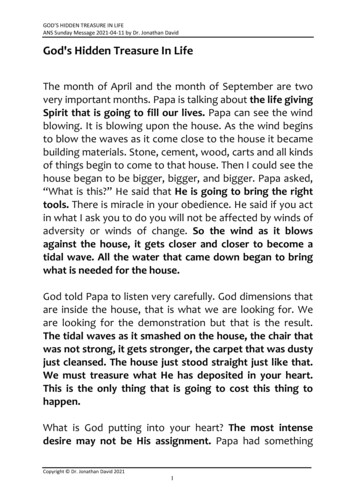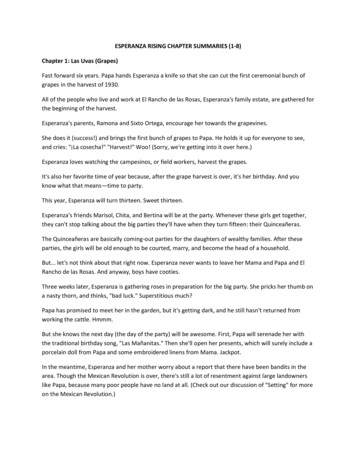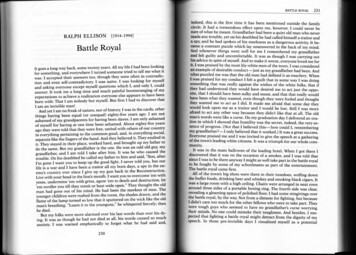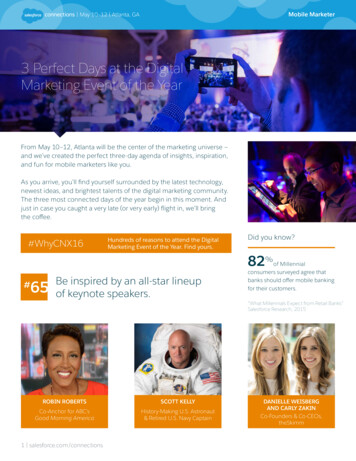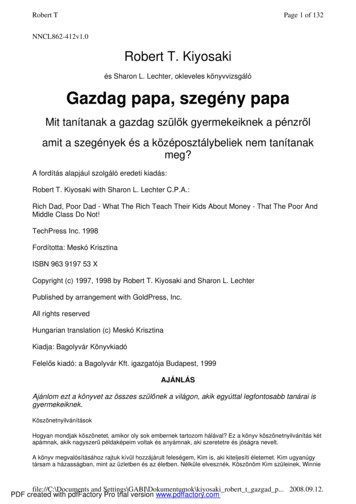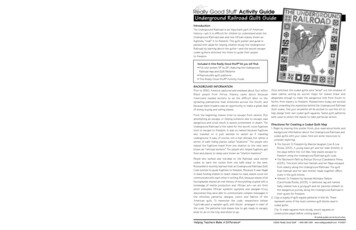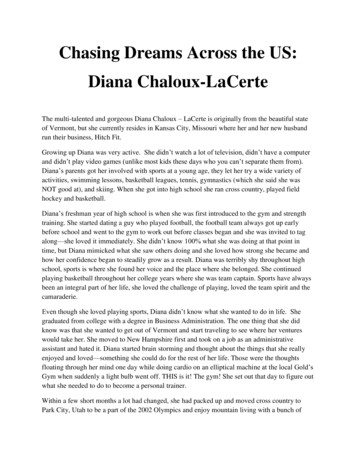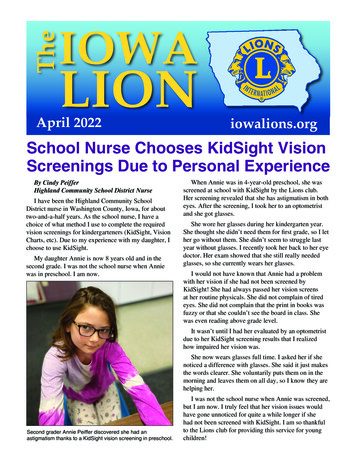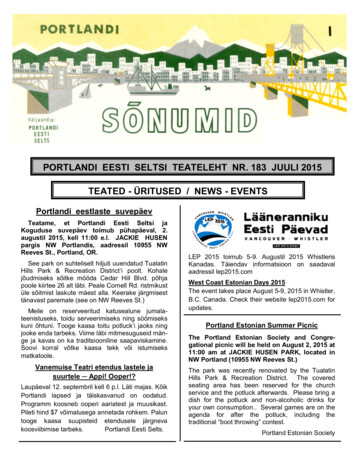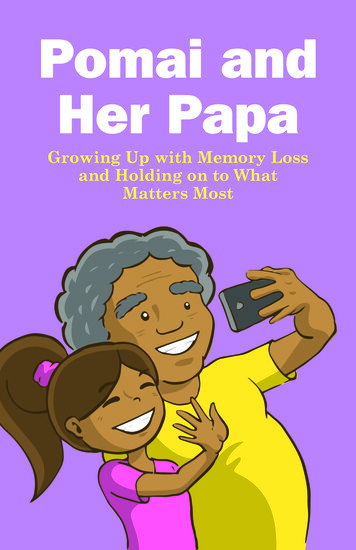
Transcription
Pomai andHer PapaGrowing Up with Memory Lossand Holding on to WhatMatters Most
–Ha– Kupuna,the National Resource Center for Native HawaiianElders, is one of three National Resource Centers for NativeElders funded by the U.S. Administration on CommunityLiving/Administration on Aging (ACL/AoA), Department ofHealth and Human Services.–Funded since 2006, Ha– Kupunaseeks to improve health–and increase life expectancy of our treasured kupuna(NativeHawaiian elders).––––He mau makana naukeiamai ko– makoukupuna.These are gifts for you from our elders.–Through their living example, our elders teach us malama–‘aina (loving care for all that lives and feeds us) and to bewaiwai (rich in heart and in spirit).This mo‘olelo (story) of Pomai and Papa is dedicated to–kupuna(elders, grandparents) and mo‘opuna (grandchildren)everywhere.A free download of this publication is available at ourwebsite at manoa.hawaii.edu/hakpuna/pomai-and-her-papaDo you remember the story of the little blue fishwho has problems remembering and loses her wayhome? This can happen to people in real life too.In this story, Pomai’s Papa (grandpa) begins to losehis memory. He gets lost. The way he acts changes.This doesn’t happen to all older people, but when itdoes, your kupuna (elder) may have dementia. It isimportant that they see a doctor to know for sure.Pomai’s family is worried and is having a hard timetalking about what to do. Read about Pomai as shesets off on a journey to learn how to help Papa.No one remembers everything all the time, butwhen someone begins to forget important things,we can all help.
Hali‘aHALI‘A – In Hawaiian, a hali‘a is a cherished memory. Theseare our favorite foods, songs and stories that remind us ofhappy times with people we love.Dementia is a disease that affects the brain. When someonehas dementia, their personality may change and they may notbe able to remember many of their hali‘a (fond memories).Dementia is not a part of normal aging. Though there are manytypes of dementia, the most common type is Alzheimer’s disease.Alohakakou, I’m Pomai! I live withmy mom, my dad, my cousin Ikaikaand my Papa. Papa has lived with us mywhole life and always looks out for me. Hemakes me feel special by doing small thingslike having my favorite fruits cut up andwaiting for me when I get home fromschool!We can use the letters in the word HALI‘A as a mnemonic(memory tool) to help us remember some ways to tell if akupuna’s behavior is a normal part of getting older, or if theyshould visit a doctor to ask if they are being affected by dementia.H: Hard to remember names, events, basic information. Maylose track of days, dates, time of year. Hard time findingthings.A: ‘Ano (a person’s basic nature, personality) changes---withthese changes can come confusion, frustration, anger andimpatience that can be seen in facial expressions, voice,gestures and behaviors.L: Loses judgment, has harder time problem-solving.I: Increasing difficulty in remembering words when speakingor writing.A: At-risk of wandering and other unsafe behavior.We hope the story of Pomai and Papa and their journeywith dementia will help you know that you are not alone innavigating this challenge.1
HALI‘A - Fun TimesTogetherPapa and I havelots of happymemories togetherplaying at the park,making poi andswimming at thebeach!23
But lately, I’ve been worried because Papahasn’t been his usual fun self.The word HALI‘A can help us understandwhat might be happening to PapaPapa, are you okay?H: Hard to remember names, events, basicinformationA: ‘Ano (a person’s personality) changesL: Loses judgment, has harder timeproblem-solvingI: Increasing difficulty in rememberingwordsPapa has a hard time remembering importantthings like paying bills. He loses things moreoften and can’t find them. Papa used to lovehaving fun but now it seems his ‘ano ischanging — he loses his temper quickly. Evenwhen we’re in the same room, he doesn’tseem to notice me. Papa seems like he’s inhis own world.A: At-risk of wandering and other unsafebehaviorI miss the way Papa used to be and amworried about him.What did I do to make him so unhappy? What’shappening to my kind, fun Papa?45
Pomai Talks toCousin, IkaikaIkaika is my cousin and my best friend. Heknows and loves Papa too.I’m worried aboutPapa—don’t you think he’sbeen extra grumpy and sad?That’s not like him!I thought sotoo, but I think itmight be somethingbigger than that.I tried to gethim to walk homewith me and he didn’tknow who I was! Atfirst I was hurt, butnow I’m justworried!6Yeah, but he’sprobably just gettingold.Theother day I sawhim at the park,just sitting therealone, lookingconfused.Whoa, that iskind of scary. I thinkwe better tell yourmom and dad.7
Pomai is Worriedand Gets SupportLately I can’t stop thinking about Papa, evenwhen I’m in class. Something seems wrongwith him, but I can’t figure out what it is. Itfeels like a dark cloud is hanging over me.One day, my teacher notices and asks me tostay after class. Uh-oh!8After class, my teacher asks me what’s wrong.I have a hard time telling her what it is. At firstI think I’m in trouble, but she is so kind andpatient. She recommends I talk to the socialworker at school for extra help.Pomai, I’mworried about you,it seems like somethingis bothering you. I’mthinking the school socialworker might be ableto help you.9
HiPomai! I’m Ms.Parker, but you cancall me Aunty Pua, I’mthe social worker atschool. Tell me a little bitabout what’s going onwith your Papa.Aunty Pua tells me that I shouldn’t have toworry about Papa alone and suggests weshare my concerns with my parents to see ifthey’ve noticed the same changes in Papa.I’m so relieved!Most of us feelbetter when we havesome information. I’d like tohelp you find out why Papa’sacting differently. Maybe yourparents are noticing some ofthe same things?Papa doesn’ttalk much anymore,he just sits in hischair and stares at thewall. Sometimes hedoesn’t evenrecognize me.I don’tunderstand what’shappening. I want tohelp him, but Idon’t know how.1011
My FamilyGets InvolvedIt’s best to express caring with concern.HALI’A is a way we can identify possiblesymptoms of dementia that differ fromnormal aging.Aunty Pua, the school social worker, meets withmy parents. They’ve also been wondering ifPapa’s memory loss and changing behavior isjust a normal part of getting older.H:Hard to remember names, events, basicinformationA:‘Ano (a person’s personality) changesThey’ve noticed he often asks the samequestion over and over again. They’reconcerned that Papa may get lost and areworried he may have Alzheimer’s disease. Theywant to take him to the doctor but think thatPapa may get angry at this suggestion. He’schanged and doesn’t seem like himself.L:Loses judgment, has harder timeproblem-solvingI:Increasing difficulty in rememberingwordsA:At-risk of wandering and other unsafebehaviorAunty Pua uses HALI‘A to help our familyremember behaviors that are not part ofnormal aging. She recommends that the familytake Papa to special doctors to find out whatcould be causing these changes.1213
Family MeetingIt feels better to talk openly and get ourworries out on the table. For the sake of thefamily, Papa finally agrees to go to the doctor.At theDoctor’s OfficePapa, momand I areconcerned. Pomaiand Ikaika too. Wewant to take youthe doctor.Papa, I love youand am worriedabout you. Maybe thedoctor can help. Let’sgo together and justsee what theysay!If we go on aweekend, Pomaicould comewith us.I’mfine! Don’t worryabout me. My memory’snot as good as it used tobe, but that happens whenyou get to my age! But,fine — I’ll go.14We take Papa to two different doctors. Firstwe go to a geriatrician who specializes incare of elders and then to a neurologistwho focuses on care for our brains. Aftertaking many tests over a few months, welearn that Papa has Alzheimer’s disease.The doctor recommends a health plan andsuggests that we meet with a social workerfrom a community organization that workswith Alzheimer’s patients and their families.15
We learn how Alzheimer’s disease affectseveryone in the family. We get helpfulinformation and learn about other communityservices —including resources for kids like me.Together, we create a plan to help Papa withimportant things like taking his medicine andkeeping him safe. I get to ask as manyquestions as I want and get a betterunderstanding of what I can do to help Papa.Let’s start bythinking abouthow to worktogether.Seeking Answersto CommonQuestionsLet’s createa safety plan.Can westill watchfootball onSundays?Of coursewe can, Pomai!I’m still yourPapa!1617
Pomai Learns MoreThe Alzheimer’s Association has found that youngpeople often have questions like these, youmight too! You can read more atWill my mom anddad get Alzheimer’sdisease?Will ost people who getAlzheimer’s are older—like Papa. Many scientistsbelieve that there’s agreater chance of gettingthe disease if someone inyour family has it, but noteveryone who is relatedwill get it. You can’t catchAlzheimer’s like you cancatch a cold or flu.What is Alzheimer’sdisease?Alzheimer’s is a diseasethat affects how thebrain works and how aperson thinks and acts.Can Alzheimer’sdisease be prevented?Scientists continue tostudy how to preventAlzheimer’s. It isbecoming more clearthat exercising, healthyeating, taking care ofyour teeth and gums,getting together withfriends, and doing braingames may help. It‘snever too late or tooearly to start!19
Why does Papa callme by someoneelse’s name?Why does he ask methe same questions?Can Papa get betteror will he get worse?Will Papa die fromAlzheimer’s?Is there anything I cando?Papa’s brain may bechanging in ways thatmake it hard for him toremember names or evenwhat you just told him.Be patient and know thatthis is not your fault orhis. Even if Papa issometimes confused, hecan still feel yourkindness.Alzheimer’s isprogressive, which meansit gets worse over time.Sadly, there’s no cure yetand Papa’s symptoms willget worse. Right now wedon’t know for sure whatwill cause his death — itcould be Alzheimer’sdisease or anotherserious health condition.Yes! You can do many ofthe things you’ve donewith Papa in the past.You told me that you andPapa like to watchfootball, play music, andwalk at the beach. Youcan still do all thesethings together.20Pomai inHigh SchoolAs I’ve gotten older, so has Papa. Hismemory continues to fade, but now I feel lessscared about what is happening and moreprepared to help. Papa has good days andbad days. Sometimes he gets mad over smallthings, but now I know that it’s not his fault ormine either! I’ve learned that there’s noshame in asking for help when I need a breakor just someone to talk to.Today I’m a peer educator. I teach other kidsand teens how to help someone withdementia. Here are some lessons andresources that have helped me with Papa,and hope they’ll help you too!21
ResourcesThere are many things I can still do withPapa. Having fun lifts everyone’s spirits!Some days, he’d rather watch than join inand that’s ok too!·········Take a walk togetherGarden or do yardworkKanikapila! Sing, play or listen to musicWatch TV or a movieRead to each otherLook at old photosPlay with a favorite pethere areCook or bake aHTsimplemany recipeavingthingsrather fun lifts every I. can still dowaoropawith Pane’s sptcthPlay a boardgamecardswihdothan joPapa.irn stillin ysin , he its! Somdaany things I caand thaeirits! SomeThere are m everyo· neT’st’s ok to days, heakspe a atstoo!wa’slkoko!thHaving fun liftdtoaningetherthan join· G· Plaarden orather watchyr yardth a favoritepe with a favori·tteeranik· Play wi workwalk togethKappetila· Take a!Sing, por liste· Colaoynrkketo/bwoplrdake a simor yaake a sim recsicoku/bCom· Garden· Wpleipeatch·TV cipereor a mng, playSi!lapika·niovieP· Kala· icyorRaea board gacmaerds board gameor listen to mus ad to· eaPlchayothorer· LiesovrdomcaaoorkTVat old p· W· Watchhahotostaofreemsomee so the· What arofeach otherunyofu· Read to Theredo witr? things youare ma the fun thingshdenelosyour eyoturpphyopadeolithreowatpndo le wholder?t with d· Lookare cariemeHere ag for alikrinre a few ntiea,car a grannde gmfoeg,arraaolikannde mle wh f their se ythpeyoau.eyopybe like ndhelpe e, anaymriebed toThere are ms, I likyou.holpe!peyoueyentia, lik dmmmthdehetheywithnthelp yopeparer stories, I houeithofwfeaHere areed me!like they helpWhat are some of the fun things your familylikes to do?Mahalo for taking time to learn more aboutmy life with Papa. On the next few pages,check out some activities to help youremember what we talked about and forresources to learn more!Dementia is tough for any family to face, butby supporting each other through takingturns and sharing the new responsibilities,we can keep Papa safe and keep our love foreach other strong.There are many people who are caring for agrandparent with dementia, like me, andmaybe like you. Here are a few of theirstories, I hope they help you like theyhelped me!30302223
People Who Can HelpTeachersSchool CounselorsMore Informationand Ways to ConnectCheck out these stories on YouTubeMy Name is LisaLisa tells us abouther journey with hermom as she losesher memory.FamilyFriendsCheck r good informationDan’s StoryDan talks about hisgrandma who hasAlzheimer’s disease.24Alzheimer’s ance@alzassociationThe Youth MovementAgainst Alzheimer’sThe Youth Movement@YouthAgainstAlz@Theyouthmovement org25
Normal changes that may happenas you grow olderSigns of possible Alzheimer’sdisease related changesMakes a bad decision once in awhileHas a harder time making good decisions—may cross busy streets withoutlooking, wants to give money to otherseven when he doesn’t have it.Gets busy and forgets to pay a billCannot remember how to pay bills oreven what bills areForgets the date or day of the weekbut later remembersLoses track of the season or yearSometimes forgets what word to useCannot seem to find the right wordsand has a hard time talking, reading orwritingLoses things from time to time andable to retrace steps to find themMisplaces things and is unable to retrace steps to find themBecoming frustrated when a regularroutine is changedMajor changes in ‘ano that cannot beeasily explained; feelings may seemover the top, out of proportion2627
Lessons fromPomai and PapaACROSS2Hawaiian word for elder5Who can diagnose someone with dementia?6Hawaiian word for family7Special doctor that specializes in care ofolder people9The most common form of dementia10Hawaiian word for personality, character ornature; this may change when someone hasdementia1235678DOWN1A tool to help us remember something3This word describes a disease that getsworse over time4Hawaiian word for memory5The part of the body that is affected bydementia28491029
Ha- KupunaNational ResourceCenter for Native HawaiianEldersEstablished in 2006, Ha- Kupunaisadministratively housed at the Universityof Hawai‘i (UH) ManoaMyron B. ThompsonSchool of Social Work (MBTSW). Ha- Kupunais a university-community partnershipcommitted to building a knowledge base onNative Hawaiian elders (kupuna)health andcare preferences that can translate to moreeffective policies and practices. Similar to oursister centers, Ha- Kupunais governed by anadvisory council composed of native eldersand native leaders, leaders in the gerontologycommunity, and administrators from theTitle VI programs. Prior to Administration forCommunity Living/Administration on Agingsupport of this center, data documented poormortality and morbidity patterns of NativeHawaiians but little was known about aging inthe Hawaiian community.Over the past ten years, Ha- Kupunaresearchers implemented a multi-methodresearch study that aimed to identifyhealth and long-term care needs of NativeHawaiian elders and their ‘ohana (family)caregivers. Through key informant interviewswith community leaders, secondary dataanalyses of State of Hawai‘i Departmentof Health survey data, focus groups withelders and families, and a review of U.S.Census data, a number of issues surfaced:disparities in longevity compared to othermajor ethnic groups in Hawai‘i, a strongrespect for kupuna,care preferences forculturally informed health and long-term careservices, and the need for service providersto be culturally grounded and responsive tocherished values. Accordingly, Ha- Kupunaworks to offer services, education, andinformation to older adults, caregivers, serviceproviders, researchers, and legislators toimprove the health and long-term care needsof kupuna.More information on Ha- Kupunareports is available at theweb at: manoa.hawaii.edu/hakupuna3031
AcknowledgmentsMahalo to the:H a- K upunaResearch Team Dr. Lana-Sue Ka‘opuaDr. Colette BrowneDr. Kathryn BraunDr. Noreen MokuauDr. Yanyan WuDr. Rachel BurrageShelley Muneoka, MSWH a- K upunaJoint Advisory Council Nalani Aki, MANalei Akina, MPAJ. Kuhio Asam, MDSister Alicia Damien-LauJ. Keawe‘aimoku Kaholokula PhDShawn Malia Kana‘iaupuni, PhDDiane Paloma, PhD, MBADeborah Stone-Walls, MC, CSAC, LMHCKealoha TakahashiLeslie TanoueLisa Watkins-Victorino, PhDSpecial Mahalo for content development and review Ivy Castellanos, Alzheimer’s Association Aloha ChapterAdrienne Dillard and Puni Kekauoha, Kula No Na- PoʻeHawaiʻiDr. Kamal Masaki, Chair of the Department of GeriatricMedicine at JABSOMTyran Terada, MSWYouth of Papakolea
These are gifts for you from our elders. Through their living example, our elders teach us malama- 'aina- (loving care for all that lives and feeds us) and to be waiwai (rich in heart and in spirit). This mo'olelo (story) of Pomai and Papa is dedicated to kupuna (elders, grandparents) and mo'opuna (grandchildren) - everywhere.
